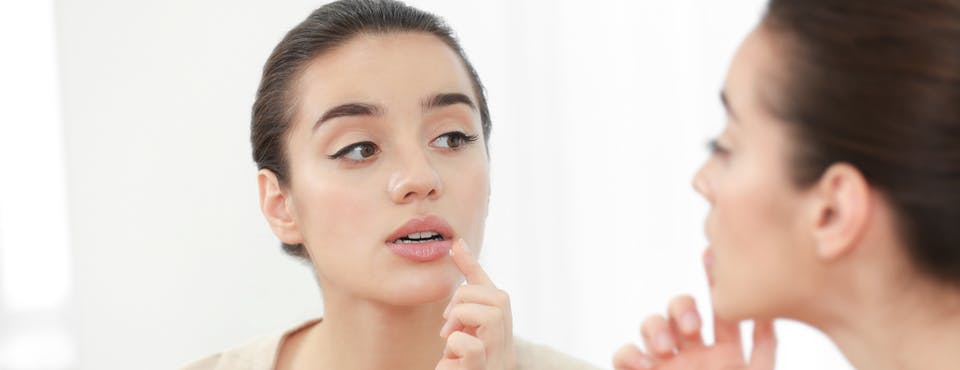Back to Dealing with Cold Sores articles
How to Heal a Cold Sore Scab
FALSE. HSV-1 is a form of the herpes simplex virus that usually affects the lips or mouth, but can spread to the eyes or genitals. This does not mean you have genital herpes as this is caused by the other form of the virus, HSV-2.
FALSE. HSV-1 is a form of the herpes simplex virus that usually affects the lips or mouth, but can spread to the eyes or genitals. This does not mean you have genital herpes as this is caused by the other form of the virus, HSV-2.
FALSE. Cold sores are contagious from the first tingle until completely healed.
FALSE. Cold sores are contagious from the first tingle until completely healed.

Cold sores, also called fever blisters, are small blisters around the mouth. When you have a cold sore outbreak, it can be difficult to deal with the painful blisters when talking, eating or just going about your normal life. Once your cold sore starts to recover, it will often develop a scab that can be painful and tempting to pick at or remove. Learn about how you should deal with cold sore scabs, whether you should remove a cold sore scab and how to help cold sore scabs heal naturally.
What are cold sore scabs?
As you probably know if you've already experienced one, cold sores come in five stages and last around seven to twelve days. They often start with a tingling, a blister forms, the blister breaks and scabs, and finally the blister heals. During the scabbing stage, your cold sore blister scabs over for two to three days. Typically, cold sore scabs look yellow and crusty. The first scab may break open, but it should re-heal into a smaller scab. Within a few days of a normal cold sore cycle, your cold sore scab should flake off naturally. Generally, they don't leave scars.1
Should you remove a cold sore scab?
Your cold sore scab may break open, itch or burn, so it's very tempting to mess with it to try to get some relief. But, you should never pick at or remove a cold sore scab before it's ready to flake off naturally. First of all, if you pick at your scab, the virus that causes the cold sore will then be on your hands. You can potentially spread the cold sore virus to other parts of your own body as well as to other people you touch. Make sure to wash your hands after touching your cold sore in any stage of its development or after applying medicated creams.2
Another reason cold sore scab removal is a bad idea is that it can delay the healing process. Scabbing is part of the body's natural healing process and picking off a scab will just cause a new scab to form and potentially take longer to heal. Also, picking a scab repeatedly may raise your chances of scarring.3 Let your body do its thing and heal underneath the scab. When the scab is ready to come off, it will flake off naturally.
How to Help Heal Cold Sore Scabs
While cold sore scabs can be painful and itchy, they mean your cold sore outbreak is almost over! Scabbing is the final stage before your skin is healed, and it's best to let your body proceed as normal. However, there are some general ways to help care for cold sore scabs and your skin. Here are a few tips for quick cold sore scab healing:
- Avoid picking or messing with the scab. This can delay the healing process.
- Wash your hands often. This will help keep your cold sore scab clean and prevent spreading the cold sore virus elsewhere.
- Avoid citrus fruits or acidic foods like tomatoes or pineapple. These high-acidity foods or beverages can cause irritation to your healing skin.
- Wear SPF and keep your lips hydrated. This can help prevent further cold sore outbreaks or lip irritation. Wearing SPF regularly can help protect your skin that's delicate while healing.
- Eat healthy and drink plenty of water to help your body stay strong. Cold sores are a virus and your body needs fuel to stay healthy and fight the virus itself.
Hopefully this helps clear up all your questions on cold sore scabs! Next time you have a cold sore, make sure to avoid messing with it or picking at it. It's best to provide your body with what it needs and let it heal itself when it comes to cold sore scabs. However, if your cold sore blisters or cold sore scabs are hanging around for much longer than they should be, you can reach out to your doctor or dermatologist for help. Visit our site for more resources on dealing with cold sores, managing your lip health and common cold sore questions.
SOURCES
1. Cold Sores Reference Summary. San Diego State University. https://sacd.sdsu.edu/_resources/files/well-being/03724-Cold_Sores_-_English__mufassercom_08-2012.pdf/ Accessed 1/4/2021.
2. Cold Sores Reference Summary. San Diego State University. https://sacd.sdsu.edu/_resources/files/well-being/03724-Cold_Sores_-_English__mufassercom_08-2012.pdf/ Accessed 1/4/2021.
3. What's a Scab? Kid's Health. https://kidshealth.org/en/kids/scab.html/ Accessed 1/4/2021.



